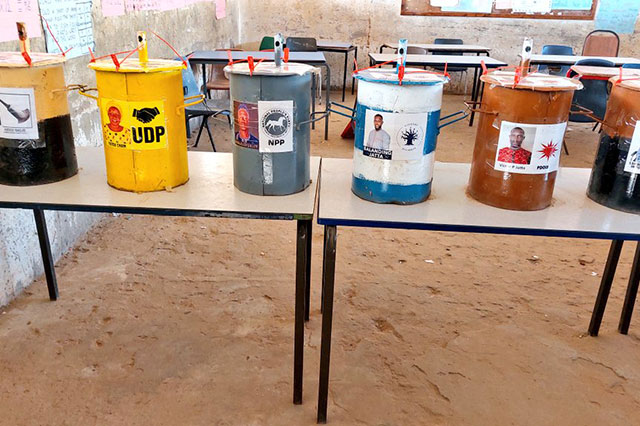Banjul – Gambians voted on Saturday to choose members of parliament in elections that could hand a parliamentary majority to President Adama Barrow, re-elected in December for five years.
Like December’s presidential elections, the vote is the latest test of the democratic transition the small west African country that emerged from 20 years of dictatorship under Yahya Jammeh with Barrow’s election as president five years ago.
The elections come at a time when democracy has suffered severe blows in west Africa, with four military coups in less than two years with Mali struck twice, and Guinea and Burkina Faso once each.
The African Union and the Economic Community of West African States (ECOWAS) have sent observers to the Gambia.
The 9th April 2022 Parliamentary Elections have officially closed now. All voters still in the queues before closing time (5pm) will be afforded the right to vote.
One of our observers took this photo at Sanneh Mentereng Constituency where six candidates were contesting. pic.twitter.com/ndYyAw1NKz— CSO Coalition on Elections, The Gambia (@CCEGambia) April 9, 2022
Despite this and other challenges, Gambians do not seem to have turned out as massively as in the presidential election to vote.
Voters are required to drop tokens into a jerrycan representing their preferred candidate.
“It is my civic duty, I have to do it, your vote is your voice. Whereby you don’t vote, you have no voice in this country,” Masona Jatta, a 36-year-old cashier, told AFP as she cast her ballot in the capital Banjul.
“We want real change for the entire gambia. Yes, we need change. Because the way Gambia is going is not promising at all,” she said, apparently referring to economic difficulties.
Nearly half of the population live in poverty.
She hopes the 1997 constitution will be reformed, which Gambia’s partners say is essential for the country’s stability.
‘Very low turnout’
Barrow has promised to do so before the end of his term.
Imam Baba Leigh, an observer at a polling station in Serrekunda, near Banjul, said: “So far what I have seen is a very low turnout. Generally, Gambians are more active in the presidential elections than the National Assembly elections.”
Gambians were asked to choose 53 deputies from 245 candidates.
After the 1,540 polling stations across the country close at 5:00 pm (1700 GMT), the results could be known on Sunday.
The president will also appoint five deputies, including the speaker of parliament.
We got a visit from the @USEmbassyBanjul Ambassador, Sharon L. Cromer and her team who shared very kind words of encouragement and acknowledged the significant impact of our work in promoting transparency in #Gambia’s elections. #ElectionsWatch220 pic.twitter.com/d9mxCyNlA1
— Elections Watch Committee-The Gambia (@Electionwatch22) April 9, 2022
The outgoing single-chamber parliament is dominated by the United Democratic Party (UDP) of opposition leader Ousainou Darboe, who was defeated by the president in December.
An April 6 poll predicted 30 percent of the vote for the president’s National People’s Party (NPP), and 24 percent for the UDP.
Alasana Conteh, 60, voted for the NPP.
“We need to have people close to the president so that they can make the job easy for him. If there are lot of opposition, it brings confusion and nothing works,” he said.
Gambia, Africa’s smallest country, is made up of a narrow strip of land surrounded by Senegal.
It is among the 20 least developed countries in the world, according to the United Nations.
Follow African Insider on Facebook, Twitter, and Instagram
Source: AFP
Picture: Twitter/@CCEGambia
For more African news, visit Africaninsider.com



